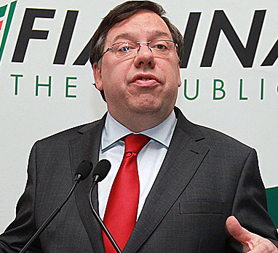Brian Cowen passes leadership to a willing recipient
Irish Prime Minister Brian Cowen has passed the poisoned chalice of Fianna Fail’s leadership to a willing recipient, writes Ireland expert Dr Peter Stafford.
This afternoon Brian Cowen entered the Irish history books – as the shortest serving leader of Fianna Fail in its long and impressive history. He hands over the post without making it past the two-year mark.
Thanks to a quirk of the Irish constitution we will have to wait until the 11th of March to assess how Cowen ranks in length of tenure as Taoiseach. He has resigned as leader of his party, but not as leader of the country.
At no point, commentators noted, did he note why it was in the national interest for him to remain as a lame duck head of government for another forty days.
The Gardai on duty outside Government Buildings this afternoon were finding it difficult to explain to passing tourists from exactly which post Cowen had resigned.
In the Merrion Hotel, across the road from Government Buildings, Cowen decided that it was in the interests of his party that it did not enter the election campaign with him as leader. At no point, commentators noted, did he note why it was in the national interest for him to remain as a lame duck head of government for another forty days.
The fact that Cowen will not lead Fianna Fail into the election will disappoint Opposition parties whose campaign strategy had been to make him the whipping boy for all that has gone wrong with Ireland’s economy. It will also disappoint all of those Fianna Fail candidates who had already printed their election leaflets.
Cowen passes a poisoned chalice onto his successor. To take over leadership of a political party less than two months before an election is a major undertaking. To take over the leadership of a political party so low in the opinion polls and so divided internally is a hopeless task.
The best the next leader can hope for is to wake up on the 12th of March with enough colleagues in Dail Eireann to form some sort of party.

Whoever is elected as leader on Wednesday is likely to see a small upswing in the opinion polls, but they are certain to know that even a dead cat, if thrown off a building tall enough, will bounce. The opposition parties are unlikely to be overly concerned. Why then would anyone want to take over the leadership?
The best the next leader can hope for is to wake up on the 12th of March with enough colleagues in Dail Eireann to form some sort of party.
Such is the loyalty and devotion that Fianna Fail attracts in its members, and such is the nature of Irish politics, despite the stakes being so low, senior Fianna Fail politicians will be jostling for position to take over as captain of a ship which is doomed to sink, if only because the opportunity to become leader is so rare.
To lead the party into a crushing election is less important to those who seek the role than to have their names recorded alongside their heroes – Charles Haughey, Sean Lemass and Eamonn de Valera. Fianna Fail is not a political party, it is a movement. It demands loyalty. Party first, policy second.
At no point in the last week has policy been an issue in the failing leadership of Brian Cowen. The issues at stake have been personality and leadership capacity. Ireland now enters into a fascinating week of party politics which will be focused on the pursuit of raw, naked power.
No discussion of policy, no swings to the left or to the right, merely survival and power-brokerage. Power and loyalty are at the core of Fianna Fail.
With the IMF effectively running the economy, and no money available to offer the electorate tax cuts and spending increases, the general election has little to offer any party in terms of policy reform. Fianna Fail has less than two months to find someone – anyone – who will go onto the hustings and campaign. It won’t be short of candidates.
It is precisely because the stakes are so low and the spotlight so strong, that this is going to be a fascinating week in Irish politics.
To those of us outside the party, it’s an offer we could easily refuse. Not so for those who have given their lives to the party and now are unable to hold back from claiming its leadership. Micheál Martin, the former minister for foreign affairs, has already declared himself a candidate this afternoon.
This raises some interesting technical discussions about the extent to which he could lead the main party of government into the election, but not be a member of the Cabinet. Brian Lenihan, the minister for finance has also announced his candidacy. This will put his handling of the economy at the front and centre of the election; something which is likely to delight the increasing number of economists who are announcing their intention to run in the general election.
While calmer heads might think that it’s better to remain quiet, allow someone else to get crushed in the election, and then take over as leader, neither Conor Lenihan (Brian’s brother) and Éamon O Cuiv (Eamon de Valera’s grandson) will find it easy to pass up the opportunity to maintain the family dynasty and decline the opportunity to lead.
It is precisely because the stakes are so low and the spotlight so strong, that this is going to be a fascinating week in Irish politics. Those who are seeking an opportunity to witness a battle of ideology will be sorely disappointed.
Dr Peter Stafford is an economic and business researcher based in Dublin, Ireland.
http://peterstafford.ie
Twitter @peterstafford




